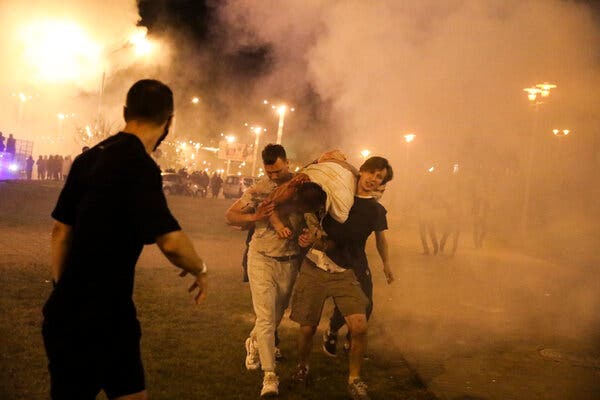MINSK, Belarus — After seeing multiple people with fractured bones, purple bruises and other injuries — the result of a brutal crackdown on protests against the widely contested re-election of President Aleksandr G. Lukashenko of Belarus — Sergei A. Dylevsky, a worker at the Minsk Tractor Works, decided he had had enough.
Last Wednesday, Mr. Dylevsky, 30, drove several protesters who were released from a detention center outside Minsk to hospitals in the area. One had lost an eye after being beaten at the facility. Shocked by what he had witnessed, Mr. Dylevsky put down his tools the next day and went through his giant factory’s workshops calling for a strike.
Hundreds of workers joined him, demanding the release of political prisoners and new elections, and turning Mr. Dylevsky into a leader of a movement that has become a major challenge to Mr. Lukashenko’s iron grip over a country he has ruled for more than a quarter century.
“I hate what he does with every cell of my soul,” Mr. Dylevsky said of Mr. Lukashenko on Tuesday as he led a group of about 1,000 workers from their factory to the city center. “I have overcome fear; my hatred for him defeated it.”
Following the presidential election in Belarus on Aug. 9, the results of which the European Union rejected on Wednesday without calling for a new vote, Mr. Lukashenko’s security apparatus has been ruthlessly trying to crush the protests. For several days, riot police officers beat protesters unconscious and sprayed tear gas indiscriminately, apparently stopping only after factory workers joined the demonstrations.
In just a week, Mr. Dylevsky turned from a factory worker (his job is tempering the steel from which tractors are made) with a passion for tinkering with cars (the Nissan Patrol is his favorite) into a political star. Wherever he appears around the city center in Minsk, in his red sneakers, jeans and T-shirt, a crowd of people gather around to listen to his calm, but commanding voice.
Folding his brawny tattooed arms, with a thoughtful look on his face, Mr. Dylevsky responded to questions from a crowd in Minsk on Friday. He was about to enter the offices of the Investigative Committee, the country’s internal security agency, which had called him in for questioning.
“The main thing is that he has no fear,” said Vadim S. Paivin, 25, an electrician, who works in the same factory as Mr. Dylevsky. “He’s just a simple guy, not an opportunist, but he knows what he needs to do,” he said. “People see it and trust him.”
A week earlier, Mr. Dylevsky had led a crowd of workers to Independence Square, the main public space in the Belarusian capital. The march seemed to catch Mr. Lukashenko off guard, and his security services were nowhere to be seen as the workers progressed through the city. Their appearance on the square was the first time that opposition supporters were allowed to protest peacefully in front of government buildings.
Mr. Dylevsky’s role in the marches has earned him a leadership position on a council set up by the opposition to coordinate actions against the government, alongside prominent Belarusians like Svetlana Alexievich, the winner of the 2015 Nobel Prize in Literature and Pavel P. Latushko, a former culture minister.
“He has all the qualities of a good manager and leader,” said Yan M. Gilevich, 29, a supporter and friend.
Mr. Lukashenko has called the council’s members “tricksters” and “wild Nazis.”
During his 26 years in power, Mr. Lukashenko purged the country’s political field of competition. Those who sought to challenge him either disappeared mysteriously, were jailed or had to flee the country.
Most of those people either represented the pro-Western intelligentsia, business elites, or came from Mr. Lukashenko’s own inner circle and had turned on him. Mr. Dylevsky represents a new type of leader, someone who, like Mr. Lukashenko himself, comes from a modest background.
Born to a family of workers in Minsk — his mother and father are also employed at the Minsk Tractor Works — Mr. Dylevsky studied machine-building at a technical college in Minsk. His mother wanted him to continue his studies and earn a degree, but he decided to leave the college and become a steel temperer.
“He said: ‘I have a head and two hands, why do I need anything else,’ ” said his mother, Anna V. Dylevskaya.
Fixing and collecting cars remains a passion, and he said he dreams of one day visiting Detroit to see the birthplace of car culture.
His mother, who is an engineer, follows him to every rally, marching with other workers as far as she physically can.
“I don’t worry so much when I see him,” said Ms. Dylevskaya, 63. If she did not, she said, she would be “afraid that something might happen to him.”
Even though he represents workers, Mr. Dylevsky does not consider himself to be left-wing. He said he believes the system built by Mr. Lukashenko in Belarus, with giant Soviet-era factories subsidized by money the country gets from reprocessing Russian oil at its refineries, is grossly inefficient.
For instance, he said he was skeptical about Mr. Lukashenko taking credit for not allowing oligarchs to own and profit from Soviet-built industrial giants, as was the case in neighboring Russia and Ukraine.
“The fact that we don’t have oligarchs in Belarus is far from being an achievement,” Mr. Dylevsky said. “On the contrary, it means that any sound businessman, be it a millionaire or billionaire, does not want to invest in Belarus and its enterprises.”
While Mr. Dylevsky has successfully led several marches of workers, he said he was disappointed he had not managed to rally more to the cause. Many workers at his plant, for instance, feared losing bonuses for staying on the factory floor, he said.
“To be honest I am disappointed about my fellow colleagues,” he said. “Still, I will lead my workers for as long as they follow me.”
Asked about his potential future in politics, Mr. Dylevsky said that he did not see himself as a political leader and did not have the education to become one.
“Politics will be the last thing I would like to do. It is a dirty business,” Mr. Dylevsky said. “One day people smile at you, the next they stab you in the back.”
Getting rid of Mr. Lukashenko is his first task, Mr. Dylevsky said, even though he worried that it might take a long time.
“Three death sentences would not be enough for what this man did,” he said.



















